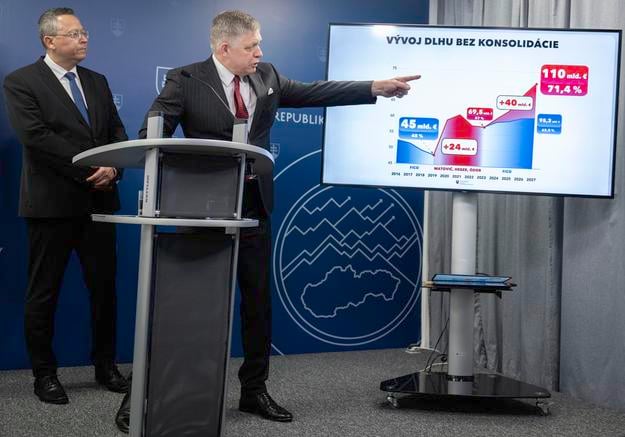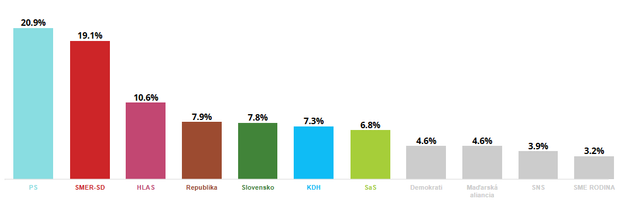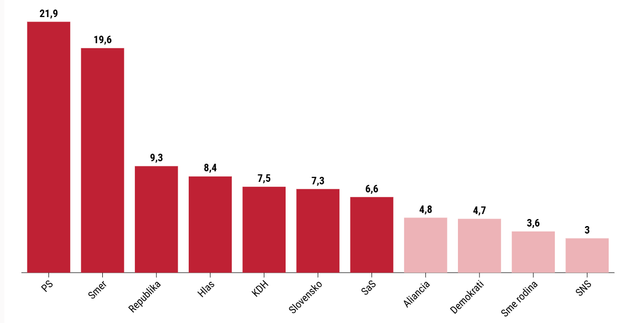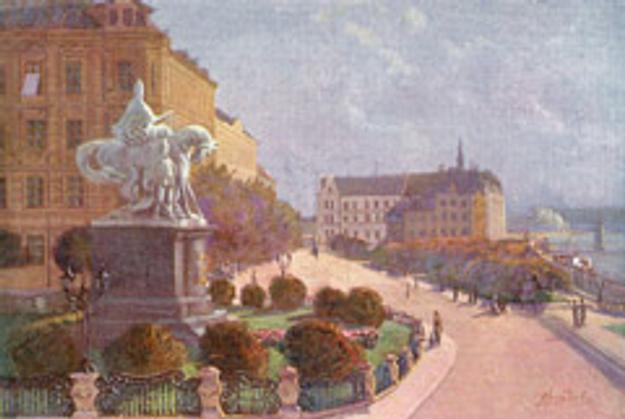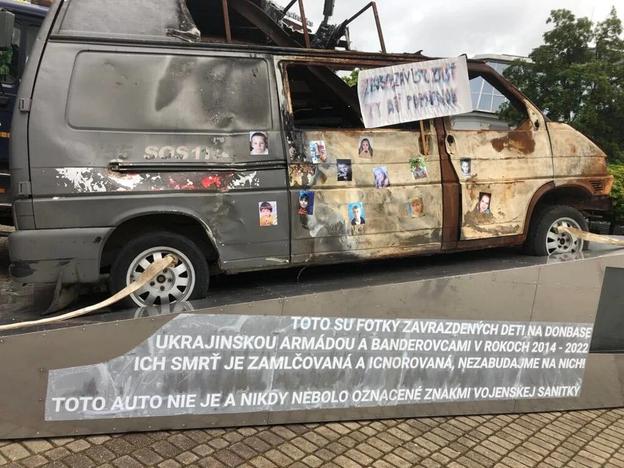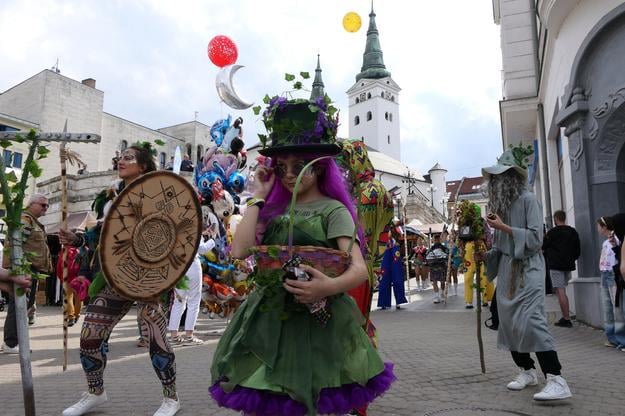Welcome to Today in Slovakia – your Thursday briefing with the top news in one place.
The coalition’s democracy-shrinking plan
Public sector employees in Slovakia, including firefighters and police officers, will receive a one-off €800 bonus in June, the government confirmed on Wednesday. The measure, approved by the cabinet, will cost the state €283 million.
In a paradoxical twist, Prime Minister Robert Fico (Smer) announced on the same day that his party was prepared to implement austerity measures targeting the state itself in a bid to improve public finances – while maintaining that a balanced budget still remains, in his words, a “fiction”. Fico’s government has already introduced policies that have imposed new burdens on individuals and businesses, including a higher VAT and a new financial transaction tax, as well as measures that place additional strain on the state budget.
On Wednesday, the prime minister floated sweeping reforms to reduce the size of the state apparatus, including cutting the number of civil servants, local governments, and members of the national parliament. He acknowledged, however, that these proposals are unlikely to gain sufficient support from either his coalition partners or the opposition.
“Let’s do it: 500 local government units, while fully respecting the titular status of mayors and councillors [compared to today’s nearly 3,000 municipalities – ed.], three higher territorial units [currently eight – ed.], 100 MPs in the national parliament [today there are 150 – ed.], and raising the electoral threshold from 5 percent to 7 percent, with state funding only for parties that win at least 7 percent and enter parliament,” Fico proposed.
For example, cutting the number of MPs would save the state only a few million euros a year.
The opposition accused PM Fico of attempting to restrict democratic competition and deflect attention from the country’s real challenges.
Although Fico’s plan is unlikely to materialise without constitutional changes – which require 90 votes in parliament and a level of unity his coalition currently lacks – one of his two partners, the Hlas party, has expressed partial support for the proposals.
Hlas wants higher electoral deposits: Matúš Šutaj Eštok, leader of the Hlas party, supports reducing the number of seats in Slovakia’s parliament to 100. On Thursday, however, he also proposed a sharp increase in electoral deposits: from €17,000 to €50,000 for parties contesting parliamentary elections, and from €1,700 to €25,000 for those running in European Parliament elections. The move, critics argue, appears designed to hinder smaller parties and limit competition. Such a proposal could face legal hurdles: the Constitutional Court has previously raised concerns about the fairness of existing deposit levels, and a steep hike may be seen as unduly restrictive. Despite this, Šutaj Eštok defended the plan as a “standard democratisation of the political system”. The far-right Slovak National Party (SNS), another member of the governing coalition, has voiced its support for the measure.
Allies slipping in polls: When it comes to raising the electoral threshold – a change that does not require a constitutional majority – Prime Minister Robert Fico is unlikely to find support, even within the governing coalition. With backing for his junior partners Hlas and the Slovak National Party (SNS) in decline, the proposal appears politically unviable. According to recent polling, the SNS would fail to enter parliament even under the existing 5 percent threshold. Hlas, meanwhile, has also seen its support fall: a Focus poll put the party at just 10.6 percent, while surveys by NMS and Ipsos showed even lower figures – 8.9 and 8.6 percent, respectively.
NMS Market Research Slovakia
Focus
Ipsos
Expert warns: If the number of MPs in Slovakia’s parliament were reduced from 150 to 100, constitutional amendments could be passed with the support of just 60 lawmakers – further weakening the country’s already fragile constitutional safeguards, according to Vincent Bujňák, a constitutional lawyer at Comenius University’s Faculty of Law in Bratislava, who spoke to the TASR news agency. “In countries with a comparable population size, the number of national legislators is even higher,” Bujňák said, citing examples such as Norway, which has 169 MPs; Finland, with 200; and Ireland, which has a bicameral parliament, with 174 members in the lower house alone.
Hungarian minority party: The proposal by Slovakia’s ruling coalition to limit state funding exclusively to parties that win seats in parliament could deal a significant blow to the Hungarian minority party, Aliancia. Under the current rules, political parties that secure at least 3 percent of the vote in national elections are eligible for state subsidies – even if they do not cross the parliamentary threshold. However, the proposed change would end such support for extra-parliamentary parties, including Aliancia (4.4 percent in the 2023 elections – ed.). The Hungarian party agrees on the need for fiscal savings but emphasised that this can be achieved more effectively and democratically than by restricting political competition. Former Aliancia chair Krisztián Forró was recently appointed as an adviser to President Peter Pellegrini on minority issues. Pellegrini, though now head of state, previously led Hlas and is still believed to wield informal influence within its ranks.
One more proposal: Political parties would be barred from changing their name or abbreviation for five years after registration or their most recent amendment, under a proposal by Šutaj Eštok’s Interior Ministry. The measure is intended to prevent what officials describe as the “trading” of parties – when entities purchase an existing party and rebrand it, rather than collecting signatures to establish a new one.
MORE STORIES FROM THE SLOVAK SPECTATOR
Immigration bureaucracy: The Interior Ministry has proposed fast-tracked reforms to ease residence procedures for foreigners.
Drug freeze: A proposed Health Ministry decree could block new medicines from Slovakia’s public insurance system, drawing fierce backlash from doctors and patients.
Bot takeover: Autonomous AI agents are set to revolutionise everyday life and work by taking over complex tasks, negotiating on our behalf, and reshaping entire industries, writes Ronit Ghose of Citibank Europe.
Justice delayed: The Supreme Court has overturned the acquittal of Marian Kočner in the Ján Kuciak murder case, ordering a retrial with new judges amid fresh hopes for justice.
Top 10 events in Bratislava: Shop Slovak design at Urban Market, toast Brittany Day on the Danube, and catch the Harlem Globetrotters.
Murín ousted: The culture minister has dismissed controversial SLC director Gustáv Murín amid growing backlash over his conduct.
If you like what we’re doing and want to support good journalism, buy our online subscription with no ads and a print copy of The Slovak Spectator sent to your home in Slovakia. Thank you.
HISTORY TALKS
Shattered empress
Unveiled in 1897, Ján Fadrus’s grand statue of Empress Maria Theresa once graced Bratislava’s Danube embankment but was destroyed amid political turmoil in 1921. The sculptor, who died young, never saw the fate of his most famous work.
DEFACED WAR MEMORIAL
Far-right leader targets Ukrainian ambulance in Žilina
In recent days, a Ukrainian ambulance destroyed on the front line and displayed for 10 days in the Slovak city of Žilina became the target of both online hate and physical vandalism, according to My Žilina.
The vehicle, known as Oksana, was defaced with a spray-painted “Z” – a symbol of support for Vladimir Putin and Russia’s military aggression – and later plastered with graphic posters and a controversial message. The posters claimed to depict children “murdered in Donbas by the Ukrainian army and Banderites between 2014 and 2022”. The act was claimed by Pavol Slota, leader of the far-right DOMOV–NS party, who questioned the ambulance’s humanitarian purpose. Drawing on personal anecdotes allegedly gathered during a visit to Donbas, Slota accused the Ukrainian army of using medical vehicles to transport troops and abandoning their wounded and dead. He warned Slovaks not to “believe propaganda dragging us into war against Russia”.
Fedor Blaščák, director of the Open Society Foundation in Slovakia, condemned the incident as vandalism and a dehumanising affront to victims of Russian attacks. He described Oksana as a temporary war memorial and said the defacement reflected deeper social divisions over solidarity with Ukraine.
IN OTHER NEWS
Following a raid on a neo-Nazi group in Bratislava, three suspects have been remanded in custody over fears they may continue to commit extremist crimes. A total of 20 people were detained on Tuesday, with 14 formally charged.
Police have summoned opposition MP and Za ľudí party leader Veronika Remišová for questioning over a criminal complaint filed by Defence Minister Robert Kaliňák. The case concerns Remišová’s public disclosure of an undeclared Croatian property linked to Kaliňák, which she claims is part of a broader effort to criminalise the opposition.
Andrej Danko, coalition partner and leader of SNS, has once again criticised the transaction tax, hinting that his party may withhold support for the state budget at the end of the year unless it is scrapped. A new Ipsos poll for Denník N shows that three-quarters of the public – including coalition supporters – want the tax abolished. The survey also found that most people feel the impact of rising prices for goods and services, blaming inflation, Robert Fico’s government, and the war in Ukraine for the cost of food.
Foreign Minister Juraj Blanár (Smer) travelled to the Kingdom of Morocco on Thursday for bilateral talks. He is accompanied by Defence Minister Robert Kaliňák (Smer) and representatives of Slovak defence industry companies. Morocco is Slovakia’s largest trading partner in Africa. (TASR)
Progressive Slovakia MP Martin Pekár has raised concerns that the repairs of bridges in Slovakia could be carried out under a classified regime by a Chinese contractor through a public-private partnership. He cited the case of Serbia, where a block of concrete fell at a station in Novi Sad reconstructed by Chinese firms, killing 16 people and sparking mass protests. Slovakia bridges have long faced criticism, with a recent example being a broken beam on a bridge in Poprad that halted rail traffic for several days on the key route between Bratislava, Žilina and Košice.
Deputy Foreign Minister Marek Eštok officially opened Slovakia’s honorary consulate in Thessaloniki, Greece, on 21 May. This step marks Slovakia’s effort to strengthen economic cooperation with Greece. (TASR)
FRIDAY WEATHER BRIEFING: Cloudy to overcast throughout the day. Rain or showers expected in some places during the day, with isolated thunderstorms possible. Western regions likely to see less precipitation as the day progresses. Unseasonably cold. Daytime temperatures will range from 12°C to 17°C, dropping to just 8°C to 12°C in northern areas and around Horehronie. (SHMÚ)
HAPPY NAME DAY: May 23 is a special day for Želmíra, so if you know one, don’t forget to send your warmest wishes. Všetko najlepšie!
WHAT TO EXPECT ON FRIDAY
Prime minister visit: Robert Fico will visit the Justice Ministry.
Fico, Danko and Šutaj Eštok: The coalition council is set to meet for talks.
Corruption: The trial of National Bank of Slovakia Governor Peter Kažimír, who is facing bribery charges, is expected to continue.
St Urban’s Open Cellars: Wine cellars will open to the public in Bratislava, Svätý Jur, Limbach, Pezinok, Modra, Šenkvice and other nearby towns.
Panel discussion: BETA Slovakia and BETA Europe will host a debate titled Europe and Youth at 18:00 at the French Institute in Bratislava. French Ambassador to Slovakia Nicolas Suran will deliver the opening remarks.
Hockey: A decision will be made on whether Slovakia will host the 2029 Ice Hockey World Championship.
Thank you for subscribing and reading. It means a lot to us.
P.S. If you have suggestions on how our news overview can be improved, you can reach us at editorial@spectator.sk.
Follow The Slovak Spectator on Facebook, LinkedIn and Instagram(@slovakspectator). For news from Slovakia in Ukrainian, click here or follow Novyny on Telegram, Facebook, and Instagram.


